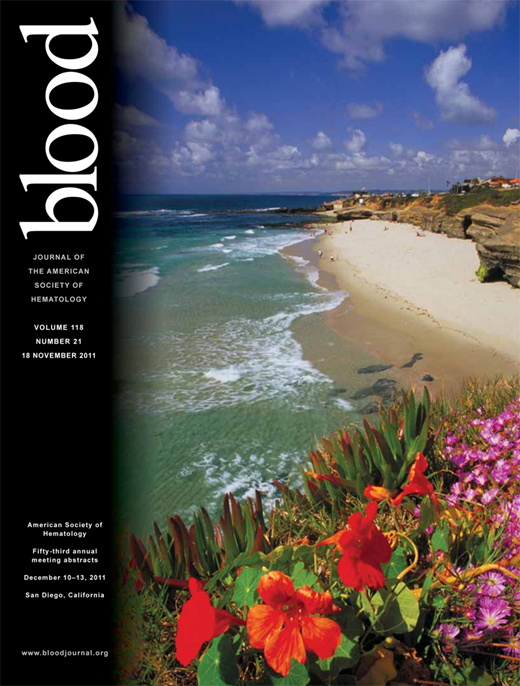Abstract
Abstract 868
Gain-of-function mutations in KIT receptor in humans are associated with gastrointestinal stromal tumors (GIST), systemic mastocytosis (SM), and acute myelogenous leukemia (AML). An activating KIT receptor mutation of aspartic acid to valine at codon 814 in mice (KITD814V) or codon 816 in humans (KITD816V) results in altered substrate recognition and constitutive tyrosine autophosphorylation leading to promiscuous signaling. Consequently, cells bearing oncogenic form of KIT (KITD814V) demonstrate ligand independent proliferation in vitro and MPD in vivo. However, the intracellular signals that contribute to KITD814V induced MPD are not known. Here, we show the constitutive phosphorylation of SHP2 in cells bearing KITD814V, but not WT KIT, which was inhibited by treatment with a novel SHP2 inhibitor, II-B08 (*p < 0.05). In addition, treatment with II-B08 suppressed the growth of cells bearing KITD814V, but not WT KIT (*p < 0.05), Human mast cell line HMC1.2 (*p < 0.05), and Human CD34+ cells bearing KITD816V (*p < 0.05). Likewise, deficiency of SHP2 in primary bone marrow cells resulted in a significant repression in constitutive growth of cells bearing KITD814V (*p < 0.05). To determine the mechanism behind the repression in ligand independent growth of cells bearing KITD814V by II-B08, we examined the role of SHP2 in cell survival. We observed a dose dependent increase in apoptosis of cells bearing KITD814V compared to WT KIT in the presence of II-B08 (*p < 0.05). Similarly, deficiency of SHP2 resulted in increased apoptosis of cells bearing KITD814V (*p < 0.05). In an effort to identify the mechanism behind reduced growth and increased apoptosis of cells bearing KITD814V in the presence of II-B08, we examined whether SHP2 regulates the activation of AKT in KITD814V bearing cells. We found constitutive activation of AKT in cells bearing KITD814V, but not WT KIT, which was significantly inhibited upon II-B08 treatment suggesting that SHP2 regulates ligand independent growth and survival of KITD814V bearing cells in part by regulating the activation of AKT. To further determine the signaling molecules that co-operate with SHP2 in KITD814V induced MPD, we examined proteins that potentially interact with SHP2 in KITD814V bearing cells and whether inhibition of SHP2 activity by II-B08 suppresses these co-operating protein interactions. SHP2 constitutively bound to p85α and Gab2 in cells bearing KITD814V, but not in WT KIT bearing cells, which was inhibited upon II-B08 treatment. To further assess whether the binding of SHP2 to p85α, Gab2 and KITD814V is sufficient to induce MPD, we generated a KIT mutant receptor, KITD814V-F7, in which seven tyrosine residues in KITD814V (known to bind SH2 containing proteins at tyrosine 567, 569, 702, 719, 728, 745, and 934) were converted to phenylalanine, and KITD814V-Y719, in which only tyrosine residue 719 (binding site for p85α) was added back to the KITD814V-F7 receptor. We observed constitutive binding of SHP2 and Gab2 to p85α in cells bearing KITD814V and KITD814V-Y719, but not in WT KIT or KITD814V-F7 bearing cells. In addition, conversion of all the seven intracellular tyrosine residues in KITD814V to phenylalanine (KITD814V-F7) resulted in complete loss of ligand independent growth in vitro (*p < 0.05) and significantly delayed the progression of MPD in vivo (*p < 0.05). Importantly, restoration of tyrosine residue at position 719 (KITD814V-Y719) was sufficient to induce ligand independent growth in vitro and MPD in vivo to KITD814V levels. Furthermore, deficiency of Gab2 resulted in significant repression in constitutive growth of cells bearing KITD814V (*p < 0.05). These results demonstrate that p85α recruits SHP2 and Gab2 to KITD814V at Y719, which might contribute to KITD814V induced MPD. Moreover, II-B08 enhances the efficacy of PI3Kinase inhibitor LY294002 in suppressing KITD814V induced ligand independent growth in vitro (*p < 0.05) and MPD in vivo (*p < 0.05). Taken together our results demonstrate that SHP2 is a druggable target which cooperates with PI3Kinase in inducing MPD.
No relevant conflicts of interest to declare.
Author notes
Asterisk with author names denotes non-ASH members.

